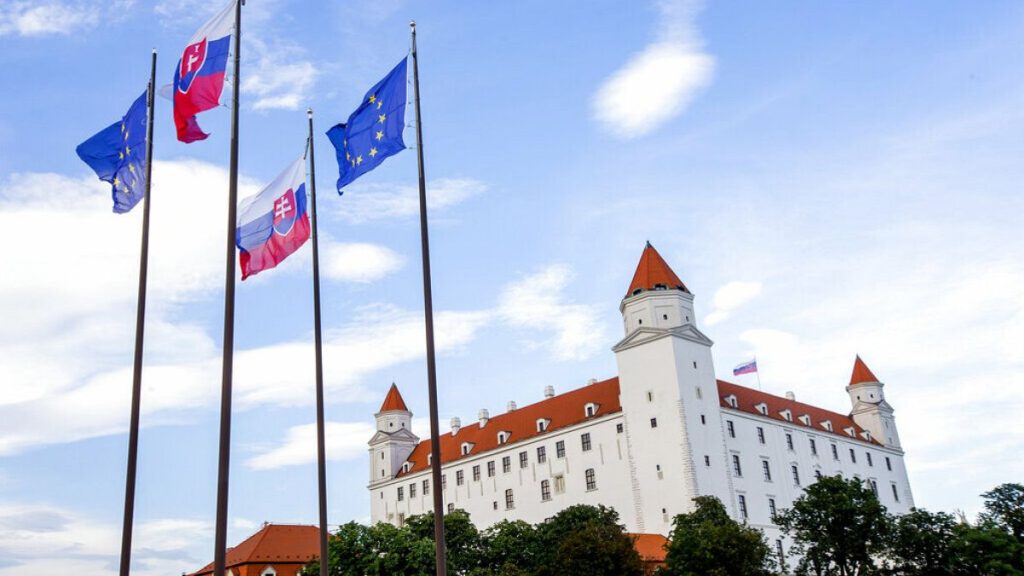The proposed amendment to Slovakia’s language legislation is causing concerns about the rights of the Hungarian population in the country. The draft law would require Slovak text to appear first on public signs and advertisements, and would prohibit minority languages on public transport and in other public spaces. Those who do not comply could face fines of up to €15,000. This amendment follows a similar law passed in 2009 which made Slovak the mandatory language for civil servants, leading to diplomatic tensions with Hungary. While relations between the two countries have improved in recent years due to shared nationalist views of their leaders, opposition lawmakers and human rights experts have criticized the proposed amendment for targeting the Hungarian minority and potentially damaging businesses and the country’s competitiveness.
Opposition lawmakers in Slovakia have spoken out against the proposed amendment, calling it “absurd” and “steeped in nationalism.” They argue that the law would restrict the rights of the population to use their mother tongue freely and limit entrepreneurship. Slovakia’s Culture Minister has defended the draft amendment, stating that it aims to strengthen the status of the state language and ensure efficient state control. Hungary’s Foreign Minister has sought reassurance from his Slovak counterpart that the rights of the Hungarian minority will not be affected by the proposed legislation. Hungarians make up about 8% of Slovakia’s population, with the historical ties between the two countries dating back to the Austro-Hungarian empire.
Slovakia’s Prime Minister Robert Fico, who has been in power for the fourth time, has taken a pro-Russia and anti-US stance, aligning himself with Hungarian Prime Minister Viktor Orbán. Both leaders have called for more EU funding to address illegal migration, and Fico has been criticized for ending military aid to Ukraine and opposing EU sanctions against Russia in response to the 2022 invasion of Ukraine. The nationalist views of both leaders have contributed to improved relations between Slovakia and Hungary, despite ongoing tensions over the treatment of the Hungarian minority in Slovakia. The proposed amendment to the language law is seen as a potential setback in diplomatic relations between the two countries.
The proposed amendment to Slovakia’s language legislation has raised concerns about the rights of Slovakia’s Hungarian population. The draft law would require Slovak text to appear first on public signs and advertisements, and would prohibit minority languages on public transport and in other public spaces. Those who do not comply could face fines of up to €15,000. This follows a similar law passed in 2009 that made Slovak the mandatory language for civil servants, leading to diplomatic tensions with Hungary. While relations between the two countries have improved in recent years due to shared nationalist views of their leaders, opposition lawmakers and human rights experts have criticized the proposed amendment for targeting the Hungarian minority and potentially damaging businesses and the country’s competitiveness.
Opposition lawmakers in Slovakia have criticized the proposed amendment as “absurd” and “steeped in nationalism.” They argue that the law would restrict the rights of the population to use their mother tongue freely and limit entrepreneurship. Slovakia’s Culture Minister has defended the draft amendment, stating that it aims to strengthen the status of the state language and ensure efficient state control. Hungary’s Foreign Minister has sought reassurance from his Slovak counterpart that the rights of the Hungarian minority will not be affected by the proposed legislation. Hungarians make up about 8% of Slovakia’s population, with the historical ties between the two countries dating back to the Austro-Hungarian empire.
Slovakia’s Prime Minister Robert Fico, who has been in power for the fourth time, has taken a pro-Russia and anti-US stance, aligning himself with Hungarian Prime Minister Viktor Orbán. Both leaders have called for more EU funding to address illegal migration, and Fico has been criticized for ending military aid to Ukraine and opposing EU sanctions against Russia in response to the 2022 invasion of Ukraine. The nationalist views of both leaders have contributed to improved relations between Slovakia and Hungary, despite ongoing tensions over the treatment of the Hungarian minority in Slovakia. The proposed amendment to the language law is seen as a potential setback in diplomatic relations between the two countries.















